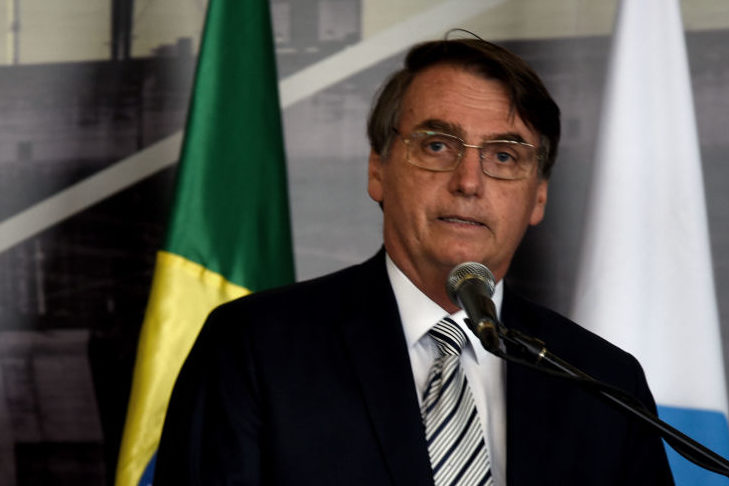Carnival is supposed to be a slow time for Brazil’s news cycle. This year, as usual, the major newspapers devoted themselves to gossiping about the winning parade floats, giving observers a chance to catch up on recent intrigues, like the op-ed brawl over Venezuela between former president Fernando Henrique Cardoso and current foreign minister Ernesto Araújo.
Then a single tweet from Brazilian president Jair Bolsonaro eclipsed in the space of a moment all the parade gossip, searing the eyes of a nation and making headlines in the New York Times and Reuters.
‘I don’t feel comfortable posting this,’ Bolsonaro wrote above an obscene video that showed two male revelers engaged in fetishistic sex acts on top of a bus shelter, in the center of a crowd. ‘But this is what has become of our city streets during Carnival. Comment and draw your own conclusions.’ So he urged his 3.5 million Twitter followers — a sum that includes who knows how many children and teenagers.
Perhaps mercifully, Twitter soon took down the video for its explicit content. Bolsonaro’s opponents criticized him for distributing something so graphic, and accused him of supplying fuel to the fire of anti-gay sentiment. His supporters praised him for using the ‘bully pulpit’ of the presidency to spread awareness of a genuine crisis of public decency. They emphasized Bolsonaro’s declared reluctance to share the video.
At one level, Bolsonaro’s own version of a ‘pee tape’ is nothing more than a lurid but momentary distraction from the business of his administration. Its appearance in global headlines might cause some slight unease when Bolsonaro visits Washington later this month, but work will go on.
His foreign minister is helping cheerlead a strong international push to support Juan Guaidó as he seeks to wrest control of Venezuela’s foundering ship of state before Nicolás Maduro manages to run it unsalvageably aground. Bolsonaro’s economy minister is untiring in his efforts to secure a long-awaited reform of Brazil’s unfair and unaffordable pension system, which, if passed by Congress, will unlock coveted foreign investment and help buoy Brazil’s battered economy. And his justice minister, national hero and former crusading anti-corruption judge Sérgio Moro, is hard at work on new laws to help restore public security to a country wracked by violent crime.
Neither, for that matter, is this the first time Brazilian politics has been brought to a standstill by an instance of indecent exposure at Carnival. In the 1990s, bachelor president Itamar Franco fended off calls for his resignation after an upskirt photo emerged of a model on his arm during the annual celebrations.
At another level, however, Bolsonaro’s intervention illustrates an unsettling fixation on the obscene which happens to be shared by the Brazilian intellectual who has exerted a strong influence on his administration. Olavo de Carvalho was for many decades a lonely voice in Brazil criticizing the left-wing cultural, intellectual, and political elite.
Relying on his considerable erudition, Carvalho propounded a fusion of economic liberalism and social conservatism familiar in the United States but vanishingly rare in Brazil. He declared war on socialism and skewered icons of the left like former president Luis Inácio Lula da Silva, who is now imprisoned for corruption.
When Bolsonaro defied both right- and left-wing political elites by winning the Brazilian elections last fall, Carvalho eulogized him on his viral YouTube channel. Carvalho, who was close to one of Bolsonaro’s sons, managed to direct Bolsonaro’s hand in choosing a few cabinet posts, including that of the foreign minister Ernesto Araújo, who has declared himself an admirer of Carvalho.
Carvalho, despite his hillbilly accent and long-ago flirtations with astrology and religious cults, is a serious thinker and one who has exerted an impressive influence on Brazil’s national life, both directly and indirectly.
But in his newspaper columns, Carvalho just as often crowns an argument with an obscene description of a sex act or other bodily function, as with a reference to an Austrian School economist or an episode from classical history. Carvalho’s defense is always the same as the one Bolsonaro’s supporters have offered: Brazilian life is so obscene already, he is simply pointing it out.
Would-be defenders of public decency ought to start by making themselves an example. Bolsonaro has a lot to learn from the erudite Carvalho, but the latter’s habit of salivating over the prurient is something he would do better to keep to himself.


















